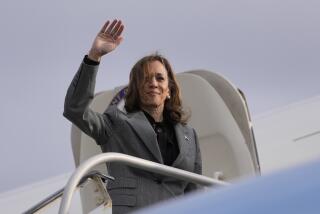Old Pros Back on the Job
In selecting his foreign policy team, President-elect George W. Bush has turned to two experienced and respected veterans of previous administrations. Colin Powell will be his secretary of State--a post that Powell declined when President Clinton offered it to him four years ago--and Condoleezza Rice will return to the National Security Council, where she served in the late 1980s, this time heading the council as Bush’s national security advisor. Both appointments were expected and are being widely welcomed.
Powell was national security adviser to President Ronald Reagan and chairman of the Joint Chiefs of Staff under Presidents George Bush and Clinton. His military and political background gives him an unusually broad perspective on global issues, as well as firm views on the need for a powerful military and a blunt wariness about how and when force should be used.
His ideas, nurtured in part by his field service during the Vietnam War, have come to be known as the Powell Doctrine: Use armed force only as a last resort, but when unavoidable use it overwhelmingly; U.S. intervention must have public support, and it should be undertaken only with a well-considered exit strategy. These tenets are militarily and politically sound. But the need for doctrinal flexibility must also be recognized. Not every crisis demands a crushing military response. Sometimes limited force can do the job.
Powell has set as a top priority rebuilding respect for the State Department on Capitol Hill, beginning with winning the funding the foreign service needs to do its work effectively. That effort could bring Powell into early conflict with powerful neoisolationists in Congress, including Sen. Jesse Helms (R-N.C), the obstructionist chairman of the Foreign Relations Committee.
Conflict of another sort may lie ahead with some of the nation’s closest allies. Powell and Rice share Bush’s interest in pushing ahead with a national missile defense system (NMD), a $60-billion project that is premised on the arguable claim that the nation can be made virtually invulnerable to missile attack and whose feasibility depends on technology still to be developed and proven. Some NATO allies whose territories would be needed for NMD support facilities oppose the system, concerned that it would bury the 1972 Anti-Ballistic Missile Treaty with Moscow, a cornerstone of arms control. Russia and China fiercely oppose NMD, worrying that if it should prove successful their missile forces could become strategically irrelevant.
The argument over NMD is only one of a number on the horizon. Rice and Powell both question why U.S. troops are still in the Balkans, regarding Bosnia and Kosovo as missions that European forces can undertake alone. Powell might also find little enthusiasm in Europe for his goal of reinvigorating the U.N. sanctions against Iraq.
The remaining foreign policy agenda is no less compelling for being familiar. Washington will be called on to continue trying to broker peace between Israel and the Arabs. North Korea remains simultaneously a puzzle, a threat and--maybe--an opportunity. A developing China and a regressing Russia are sure to require a lot of attention. And then there are the unforeseen crises every administration sooner or later confronts. Bush is fortunate in being able to turn to a team that knows its way around the international arena. He will no doubt be calling on their talents and experience often.
More to Read
Get the L.A. Times Politics newsletter
Deeply reported insights into legislation, politics and policy from Sacramento, Washington and beyond. In your inbox three times per week.
You may occasionally receive promotional content from the Los Angeles Times.










